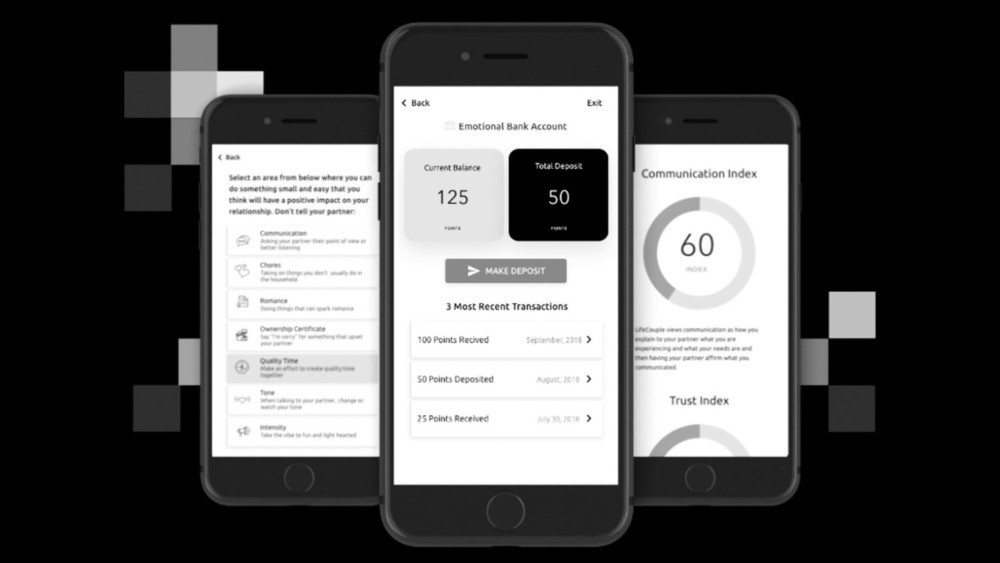By Brittany Meiling
The San Diego Union-Tribune
WWR Article Summary (tl;dr) Want to avoid or altogether skip the therapist’s couch? Maybe the “LifeCouple” app is for you. “Lifecouple” has several features, but they all center around four tenets of a healthy relationship: communication, trust, intimacy and conflict resolution.
The San Diego Union-Tribune
For meeting new dates, there exists a legion of tools: Tinder, Grindr, Bumble, OKCupid. But once two people are a couple, are there any apps that help them stay together?
An entrepreneur in Carmel Valley, Calif., is working on an app to do just that, and he’s leaning strongly on the research of relationship psychologists to guide his way.
The app, called LifeCouple, was launched by longtime sales and marketing executive Sean Rones, who’s been through his fair share of marriage therapy sessions.
“I think I’ve been to about eight marriage therapists,” Rones said, grimacing. “And let me tell you, men don’t want to go to therapy. Asking men to go to therapy is like asking them to get a root canal.”
Married for 19 years now, Rones said it was his experience on the proverbial couch that drove him toward the idea for LifeCouple. Therapy, he says, is a hassle.
“You have to get in your car and drive to the therapists’ office, where they’re going to send you home with paper worksheets to complete,” Rones said. “In today’s day and age, why not take the best practices and put them in a digital format?”
After all, he said, logging onto an app every day is far less intrusive than spilling your personal life to a stranger.
WHAT DOES THE APP DO?
LifeCouple has several features, but they all center around four tenets of a healthy relationship: communication, trust, intimacy and conflict resolution. Upon signing up, the app will prompt each user to rate their level of satisfaction (on a scale of 1 to 10) in different areas of their relationship, such as “affection” or “intimacy.” If one partner happily reports a 10-level satisfaction, but the other submits a 1, then the app flags the area as something the couple needs to work on. In this example, one partner might be oblivious that the other isn’t on the same page.
The idea here is to prevent dissatisfaction from getting swept under the rug. Rones hopes people will use the app proactively to keep their relationships happy, rather than turning to the app once therapy is needed.
“If we get dissatisfied in a relationship, we tend to think the grass is greener on the other side,” Rones said. “But it’s greener on the side where you water it.”
The app is packed with other relationship-maintenance tools, including an “emotional bank account” feature that lets users assign point values to actions they find meaningful. For example, a partner could assign a 200 point value to “quality time” or “helping with household chores.” When their mate complies, he or she earns 200 points on the app.
CAN IT WORK?
Gail Heyman, a professor of psychology at UC San Diego, studies social cognition and has an app of her own, Beyond Small Talk, to help deepen relationships. She says LifeCouple has the potential to be impactful in relationships. One thing she likes is the ability to know your partner’s perception of things.
“People tend to think their view of the world is objectively true, and they have a hard time seeing other people’s perspective,” Heyman said. “Giving people insight into what their partners are thinking is valuable, and it might get conversations happening that wouldn’t happen otherwise.”
But Heyman has a few concerns about technology, especially cellphones, also serving as a barrier between couples.
“The technology itself can be a distraction,” Heyman said. “There’s a lot of research that shows technology interferes with closeness in relationships. I also worry about the app’s focus on outcomes, numbers and percentages. People want to quantify everything these days, and it can lead to obsessiveness and competition that’s probably not good.”
All in all, though, Heyman was positive about Rones’ idea. Whether we like to admit it or not, she said, it might be handy to have a tool to manage your relationship.
“In an ideal world, you wouldn’t need reminders to think about the other person’s needs, but that’s hard for a lot of people,” Heyman said. “When we’re distracted and pulled in so many different directions, we have to prioritize our relationship.
buy lipitor generic buy lipitor online no prescription
People think in the abstract that their relationship is important, but they don’t invest much time in them.”
STATUS OF LIFECOUPLE
LifeCouple was launched in December, and has about 1,000 users on board. Rones said those downloads happened naturally through word of mouth, without a coordinated marketing effort. He’s gathering feedback and tweaking the app based on his customers’ responses.
LifeCouple is early in its life, so Rones only employs about 10 contractors. Before seeking growth capital, Rones said he wants to see 10,000 users on board to prove to investors that his idea has staying power.
Rones said he has big plans for the future of LifeCouple, including rebranding as The Life Company and expanding into parent/child relationships and employer/employee relationships. But one step at a time.
Like popular meditation app Calm or online therapy app Talkspace, LifeCouple intends to charge users on a subscription basis, $144 for the year, or a larger amount paid monthly. For now, it’s free to download. The app is available on Apple’s App Store and Android’s Google Play.














































































































































































































































































































































































